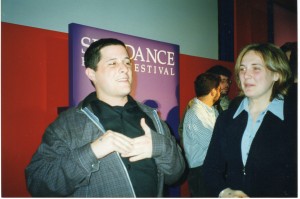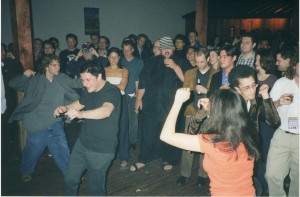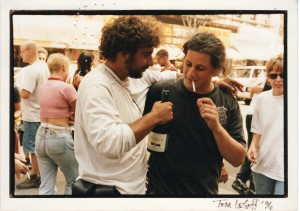By Morgan J. Freeman
This story won’t shock anybody who knows me — but I’m hoping it might help some who don’t.
When my debut feature, Hurricane Streets, won an unprecedented three awards at Sundance in 1997 (Audience Award, Best Director, Best Cinematography), I thought I’d arrived at the age of 27. I was sure of it. All my hard work had paid off and I was, as they said, “set.” With the struggle behind me, it was time to celebrate, to bask in the glow of my crowning achievements and settle in as one of our industry’s top directors.

But early success went straight to my head. Bigtime. Something shifted when I won those awards — my ego was fed a huge dose of You Rule Pie — and I was consumed by it. I became completely self-absorbed with my achievements and couldn’t celebrate them enough. Fueled by a false sense of my place, I lost sight of my way — and had zero ability to capitalize off the moment in a sane, strategic way. I skipped key industry meetings, canceling last minute if at all; refused a meeting with an A-list actor because a producer wanted to be present; boycotted a critical on-set budget meeting with a financier so I could watch X-Files (he now runs a studio); was more interested in dating the lead actress than directing her; and showed up on set with last night’s party all over me.
When my agent, manager or lawyer advised me to clean up my act, I fired them (usually over vitriolic late night emails). Without really grasping what was happening, this small window of opportunity — one I perceived as permanent, as “mine” — slammed shut. And by the time I came to six years later, it was as if it had never really been opened at all.
I was 33, scratching my head, wondering what the fuck had just happened? How had my life become so small? How did I end up in major debit, unhireable, and living back in my childhood room at my parents’ house? Apparently, while I was telling everybody how amazing I was, the world was moving on without me. While I was spewing B.S. or nodding off in some VIP section of a Soho club, others were focused on their careers, their families, or their sleep. I learned the hard way the high price of doing all the next wrong things.
I recall people telling me to focus on the next project, to strike while the iron was hot, but for some reason I couldn’t hear them. It never registered. My agent warned me not to get a big head and not to party too much. Even his assistant told me that this rare window wouldn’t stay open long. But I was so high on my own shit that I honestly thought whatever I touched next would turn to gold. That it would be successful because I wrote it! It will be great because of me! So rather than get to work, I continued to celebrate.
 That’s not to say I didn’t have my next project lined up. I wrote a new script before arriving at Sundance — Desert Blue. I wanted to be ready with my next project. And with the Sundance success, I had no problem finding financing. The problem was with its content. The script just wasn’t that good. It was basically a first draft and desperately needed development. But with a head the size of small planet, I wasn’t willing to put the work in. I’d found a great cast and had secured financing. So it must be a fantastic script, right? Besides, cast availability didn’t leave time for development and we had a start date.
That’s not to say I didn’t have my next project lined up. I wrote a new script before arriving at Sundance — Desert Blue. I wanted to be ready with my next project. And with the Sundance success, I had no problem finding financing. The problem was with its content. The script just wasn’t that good. It was basically a first draft and desperately needed development. But with a head the size of small planet, I wasn’t willing to put the work in. I’d found a great cast and had secured financing. So it must be a fantastic script, right? Besides, cast availability didn’t leave time for development and we had a start date.
I recall the host of this site giving me notes on the script. In fact, he was open to producing it, but he and his partners wanted to develop it further. They suggested working on the location, the characters and the story… to take the script to the next level so it could build on what Hurricane Streets had started. But I wasn’t open to doing that work. I kept going back to the idea that it’s good because I wrote it. That I will bring the magic to the set and transform these pages into cinematic gold. Today, I wish I’d listened. He, and others, were right. To quote my former NYU Professor Bill Reilly, script is “coin of the realm.” How’d I forget that? Success is blinding.
I was shocked and devastated when Desert Blue was not selected by Sundance in 1999. As a multiple award winner, I thought I was a shoo-in. I thought it was automatic. I was wrong.
I’m not sure anybody could have gotten through my massive ego and I’m pretty certain that I needed to go through my process. Looking back, it’s been my own Harvard education of sorts. By sharing my story today, I hope others who experience overnight success can spot their own red flags and won’t have to hit as deep of a bottom as I did.
Another big component I had to come to terms with was WHY I wanted to be a filmmaker. I definitely loved movies and was fascinated by the process and magic of filmmaking. Inspired by Kusturica’s Time of the Gypsies & Arizona Dream, Malick’s Badlands, Truffaut’s The 400 Blows and Tarantino’s Reservoir Dogs — I knew I wanted to tell my own bold stories. But somehow I became more interested in being a famous director than telling a great story. The best part of the film was my credit!
I understand today that the power of cinema lies in collaboration and that it takes an army. Early on in my career, I described directing as playing host to a creative dinner party. My job was to carve out a safe place for people to be their best, be their most honest, to take risks and to feel comfortable. Where did that philosophy go? A taste of fame and it vanished. Today, I see how important that is on and off the set, at work, play and home.
Chasing fame can have devastating effects — particularly if you’re not ready. But only by achieving it could I realize just how truly thin it is. If all you want is to win, what really happens when you do? Your dream is realized and crushed at the same time — and while you might have an award, what do you really have?
Truth is, fame is not worth chasing. It’s a byproduct of hard work, success, luck and timing. By not appreciating the fabric of the journey, and all of the little things that gave the experience meaning, one arrives at a very lonely place. My perceived top was a sad, dark place. It nearly killed me. But who wants to admit that? I mean, anybody can look happy in a photograph.
Ironically, this was the theme of Desert Blue. The script centered on a newly famous TV star who gets stuck in a small town without cable TV on the eve of her show’s premiere. The town doesn’t recognize her and she’s forced to come to terms with who she is without the level of attention she’s accustomed to in LA.
 I see clearly now that I was more focused on winning, achieving success and being seen than I was on storytelling and working collaboratively. I was more focused on taking credit than giving credit. It was more important to be in the right rooms partying with the right people rather than developing a craft or focusing a voice. I was seduced by celebrity and completely blinded by bling, taking all of the success for granted. I was a taker not a sharer.
I see clearly now that I was more focused on winning, achieving success and being seen than I was on storytelling and working collaboratively. I was more focused on taking credit than giving credit. It was more important to be in the right rooms partying with the right people rather than developing a craft or focusing a voice. I was seduced by celebrity and completely blinded by bling, taking all of the success for granted. I was a taker not a sharer.
Only via hindsight can I see how everything was a collaboration — and I was only where I was because of the hard work of many, many people, coupled with a big dose of good fortune. Gratitude and humility suddenly became the touchstones of a truly happy life. Had my eyes never opened, I’d most likely be another Hollywood fatality statistic. Another bright star who died too young and too fast. It happens everyday in this business.
A very wise person once say that when the window of opportunity opens, drag everybody who helped you through it too. Without them, you’ll suffocate. Selfishly, I jumped through the window basically alone and, without the proper perspective, was doomed.
It’s been over 15 years since Hurricane Streets won Sundance. I’ve never been back to that festival. I turned down an offer to workshop Desert Blue in their writer’s lab because I thought I was past that. I was able to make five additional movies, but I was never able to make a stable living at it.
Today, I have a very satisfying career in reality TV. I work with a fantastic team of creative and good-hearted people. I have a routine and feel a part of something special. I’m not alone and my world is big — full of friends and family. And I am happy.
But I do feel a pang to get back to my roots, to get back to the magic of movie making, to write a new story infused with some of what I’ve learned along my path thus far. If script is coin of the realm — character development can’t be too far behind, huh?





